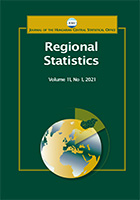The impact of urban characteristics on the spread of Covid-19 in 2020: The case of Java Island cities, Indonesia
The impact of urban characteristics on the spread of Covid-19 in 2020: The case of Java Island cities, Indonesia
Author(s): Adiwan F. AritenangSubject(s): Social Sciences, Economy, Geography, Regional studies
Published by: Központi Statisztikai Hivatal
Keywords: urban characteristics; Covid-19; mobility; population density; Java Island
Summary/Abstract: The world has been combating the Covid-19 global pandemic for almost a year, with cities being at the centre of the fight against the pandemic. However, variations in urban characteristics, population, economic size, and connectivity have led to different impacts of the pandemic’s dispersion between cities. The pandemic has disrupted social and economic activities in the Java metropolitan area, which accounts for more than 60% of the national economy and boasts a population of more than 60 million people. Using spatial and econometric analysis on the Java metro area as a case study, this paper shows that large cities and core-metropolitan areas are more prone to the pandemic due to higher population density and commuter rate; these factors determine the number of positive cases. This study highlights the importance of spatial and economic activities in urban policies for the containment of the spread of Covid-19.
Journal: Regional Statistics
- Issue Year: 12/2022
- Issue No: 03
- Page Range: 3-17
- Page Count: 15
- Language: English

